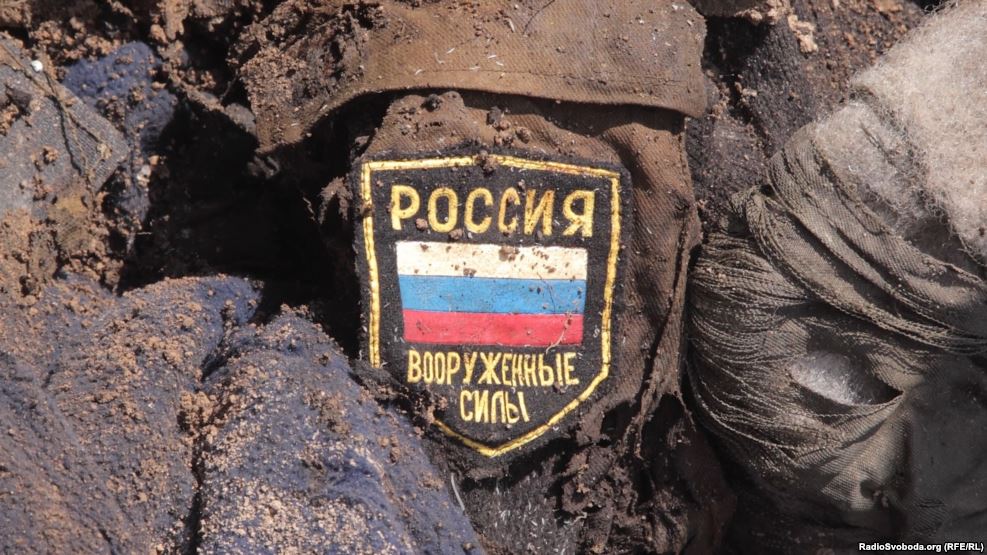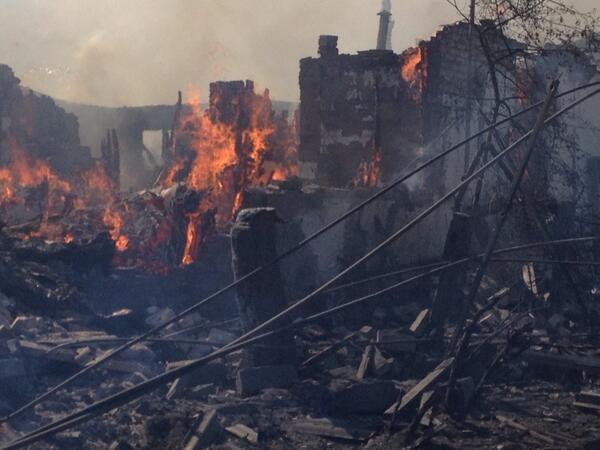A view from Georgia: Ukraine is not fighting for European integration but a right to different state project independent from Putin’s Russia.
Ukraine is obviously in the most dangerous position since 1991 at the moment. The country that survived the shock of revolution did not have enough time to recover and begin the necessary reforms in conditions of peace. Immediately after Yanukovych’s flight Ukraine was subject to Russian aggression, first in the shape of Crimean occupation, and then the war in Donbas. This war is so far following the Abkhaz scenario of 1992-1993, with the import of mercenaries from Russia, formation of groups of local mercenaries and individual Russian special ops missions. Meanwhile there is a constant threat of direct military attack on part of Russia.
It is notable that the entire current Ukrainian crisis, since the very beginning, has been constructed by the Kremlin. The formation of the situation at hand began with Yanukovych’s sudden decision to refuse the signing of the Association Agreement. This was a signal of the “Eurasian” U-turn in foreign policy, which was categorically unacceptable for the Ukrainian society. Yanukovych made this decision as a result of harsh pressure from the Kremlin. Accordingly, it is Russia’s action that provoked Maidan. Later, during Maidan, the Kremlin constantly demanded that Yanukovych take a firm position regarding the rebels. The result was bloodshed in Kyiv and Yanukovych’s flight. Russia followed by engaging in completely obvious and audacious actions using the forces of its own army and special services, which create danger not only for Ukraine, but for Russia itself.
Russia, having started aggression against Ukraine, took a big risk. A natural question arises: why are they doing this? The dwellers of the Kremlin should have serious reasons to make the decisions, which, in the end, may lead to the crash of the Russian Federation in its current form. The attempts to explain the events exclusively with Putin and his associates’ evilness or psychological disorders are superficial and imprecise.
Kremlin’s key motive is that the current attempt to turn Russia into one of the world force centres cannot be successful without control over the fate of Ukraine. Russians can only accept two forms of Ukraine’s existence: either in their (and only their) indivisible sphere of influence, or Ukraine has to be divided into parts, some controlled from Moscow, and the rest in a state of complete helplessness and chaos. The Kremlin tried to achieve the first option. The crown jewel of this very attempt was forcing Yanukovych to make a 180 from Europe to Eurasia. However the Ukrainian people demonstrated quite clearly on the streets of Kyiv that the execution of such a scenario is physically impossible. Accordingly, the Kremlin understood that their only chance to retain a living imperial project lies in the second option – dividing Ukraine up into pieces. Which is what they are trying to do now. A great risk, which they are resorting to because of this attempt, is motivated by that, according to their viewpoint, they cannot achieve their strategic goals by any other means.
Control over Ukraine’s fate is considered essential by the Russian government because of a whole number of reasons: geo-strategic and more concrete ones.
Moscow needs Ukraine as a buffer, a geopolitical barrier with Europe, which would allow them to control various forms of influence which may come from the West – from security issues to political ideas. Ukraine is especially important in this case because of its long border with Russia’s central part. Two other key, because of similar reasons, countries are Belarus and Kazakhstan, which are already under Russia’s influence.
Kremlin’s other motive is the prevention of the formation of a new regional geopolitical centre in Kyiv by Russia’s side. Even taking into account its current pitiful state, Ukraine has a great potential, which may be realised should the country develop normally. We have Poland as an example, which in the recent years has become a visible European player. And Ukraine is bigger than Poland in terms of both population and territory. However, as opposed to the latter, Ukraine is very close to the centre of Russia, which makes its empowerment very unacceptable for the dwellers of the Kremlin. Throughout its entire history Moscow constantly tried to cleanse the adjacent territories with the goal of preventing the formation of alternative geopolitical centres. The current events are a continuation of this traditional Moscow strategy.
The Kremlin also has more concrete reasons. They are the desire to use Ukraine’s demographic and economical resources for the development of Russia (or at least half ot it); and the strive to receive firm access to the Black Sea coast with Sevastopol and Odesa; and the great importance military productions located in eastern Ukraine have for Russia; and Ukraine’s shale gas reserves. In sum, the list of reasons motivating Russia to prevent Ukraine for escaping its influence by all means is quite impressive.
However, in addition to the listed sources of Russian motivation, there is something else, characteristic of both the Russian government and the vast majority of Russian society – an irrational, subconsciously-formed, pathological hatred towards the Ukrainian state project in itself. After 1991 many former USSR countries experienced the aggressive moods coming from Russia. Georgia in this sense had to take front-row seats. But the ardent hatred the Russian governors have towards Ukrainian sovereignty cannot be compared with anything in terms of its passion, height of emotion and desperation. They hate the very fact of Ukraine’s existence independent from them.
The reason for this hatred lies in Ukraine being an option alternative to Russia for the development of the join historical root named Rus in the Middle Ages. For half a millennium Moscow managed to hold a monopoly in this regard. After the 15th century the only attempt to create a different state centre on the historical space of the former Kyivan Rus was Hetmanate Ukraine in the 16-17th centuries, which was weaker after the first years of its existence, and then suffered defeat and was engulfed by the Russian Empire. The existence of actually sovereign Ukraine within its current borders ruins Russia’s monopoly on the historical heritage of Rus, for the first time since the Moscow Principality. Ukraine is a different, non-Moscow Rus. Few of the imperialistic Russians understand this very clearly, and even fewer admit it in public. However the real reason for the hatred towards Ukraine they are experiencing and loudly expressing is the fear of the competitive state project in the general geographic area with the same historical roots.
This project may turn out to be more successful in many regards. Russia has been the most despotic state in Europe (except for, maybe, the Ottoman Empire) to begin with. Later, only several years after the beginning of democratisation in 1905, it handed itself over to the completely inhumane Bolshevik regime. Now it is a decaying empire with a deep internal systemic crisis and a quite questionable future.
Ukraine, should it withstand now, has chances of a brilliant future. Not the nearest future, no. On the contrary, at the moment it is obvious that even with the most beneficial development of events, Ukrainians will have to face numerous challenges, at least those that have to do with economics However, should Ukraine successfully withstand the current challenges, in the long-term perspective it may become one of the most successful countries in Eastern Europe, and more.
This is what is unacceptable for the Russian government. A successful, strong and democratic state with a centre in Kyiv will serve to discredit the Moscow authoritarian project with the very fact of its existence. In the eyes of the surrounding peoples, as well as the many people living inside the Russian Federation. The combination of Ukraine’s size, its geographical location and the big potential with its joint historical root with Russia births fear among the Russian imperialists. Including the citizens of Crimea, apparently.
At the mount Russia is doing everything possible to eliminate Ukraine’s chances at the initial stage. The Russians have engaged all the mechanisms they have at their disposal to destroy Ukraine, all except a mass military invasion. They will resort to this step as well, should their current “Abkhaz” tactic not bear the expected result.
The Kremlin’s current goal is a complete division of Ukraine in the shape of the cessation of Donetsk, Luhansk, Kharkiv, Dnipropetrovsk, Zaporizhya, Kherson, Mykolayiv and Odesa oblasts. The Russians are not going to limit themselves to Donbas. They only need it in order to continue taking Ukraine apart based on its territory. In the end, they intend to create a controllable formation on the annexed Ukrainian lands (besides Crimea) which is most likely to be called “Novorossiya.” It is not too important whether Russia will formally annex this formation, retain it as an ‘unacknowledged republic,’ or come up with something else. This is a matter of technique. The essence will lie in the total control of this territory by Russia.
The rest of Ukraine is to face a sad fate. The Russian may try to put a marionette government in Kyiv, however even if it doesn’t happen, the fate of the unoccupied part will still be quite unfortunate. In case the Kremlin scenario is executed, the rest of Ukraine will become a completely helpless territory – without a sea border, without prospective development and, most likely, with political chaos which will be regularly incensed from Moscow.
Ukraine is standing at a crossroads now. The fight is not for European integration, and not for Donbas or Crimea. The fight is underway for the very future of Ukraine. For whether it will become a free, flourishing and strong state, or a broken toy in the hands of the Kremlin despots. The good news is that the outcome of this fight depends for the most part on the Ukrainian citizens themselves. Despite of what the Kremlin is doing now, and what it will resort to in the future.
David Batashvili, publicist (Georgia)
Translated by Mariya Shcherbinina





